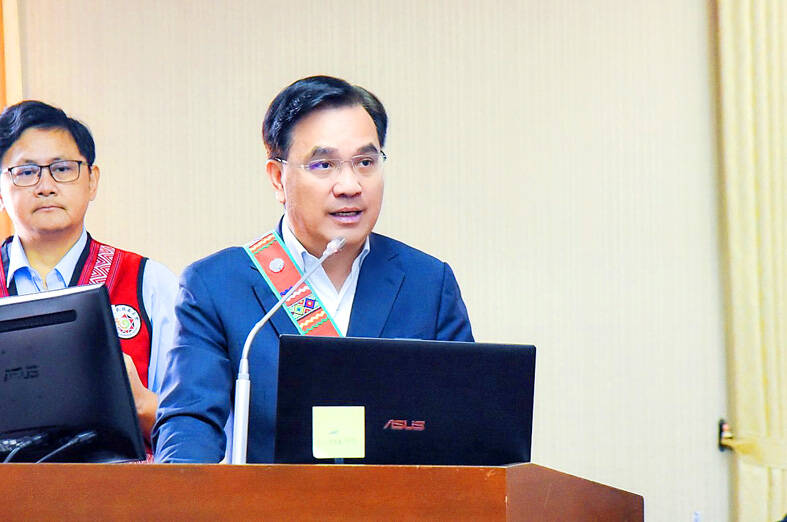The legislature yesterday passed an amendment that allows people with only one indigenous parent to register to obtain indigenous status.
The amendment to the Status Act For Indigenous Peoples (原住民身分法) follows a Constitutional Court ruling issued last year that deemed unconstitutional a provision granting indigenous status to people with only one indigenous parent based strictly on their name.
That ruling also upheld the right of adopted children to seek indigenous status.

Photo courtesy of the Council of Indigenous Peoples
“In practical terms, it increases the number of people with official indigenous status,” Council of Indigenous Peoples Minister Icyang Parod said.
As a result, the government would seek to boost the budget for indigenous peoples, for social welfare and other subsidies, he said.
In the past, if only the mother had indigenous status, when the child registered under their father’s surname, they would not be recognized as an indigenous person.
The Constitutional Court said that requirement contravened Article 7 of the Constitution, which stipulates that all people are equal under the law, regardless of gender.
Now, a child of one indigenous parent can gain indigenous status by registering with the traditional name of their indigenous parent, or with an indigenous name and a Chinese name, or by registering with the surname of their indigenous parent, but not their traditional indigenous name, Icyang said.
Ministry of the Interior data from the end of last year, showed that the nation’s indigenous population is rising, with about 584,000 people, 0.6 percent more than 2021, from the 17 recognized indigenous groups in Taiwan, which was 2.5 percent of the nation’s total population.

Taiwan is stepping up plans to create self-sufficient supply chains for combat drones and increase foreign orders from the US to counter China’s numerical superiority, a defense official said on Saturday. Commenting on condition of anonymity, the official said the nation’s armed forces are in agreement with US Admiral Samuel Paparo’s assessment that Taiwan’s military must be prepared to turn the nation’s waters into a “hellscape” for the Chinese People’s Liberation Army (PLA). Paparo, the commander of the US Indo-Pacific Command, reiterated the concept during a Congressional hearing in Washington on Wednesday. He first coined the term in a security conference last

Prosecutors today declined to say who was questioned regarding alleged forgery on petitions to recall Democratic Progressive Party (DPP) legislators, after Chinese-language media earlier reported that members of the Chinese Nationalist Party (KMT) Youth League were brought in for questioning. The Ministry of Justice Investigation Bureau confirmed that two people had been questioned, but did not disclose any further information about the ongoing investigation. KMT Youth League members Lee Hsiao-liang (李孝亮) and Liu Szu-yin (劉思吟) — who are leading the effort to recall DPP caucus chief executive Rosalia Wu (吳思瑤) and Legislator Wu Pei-yi (吳沛憶) — both posted on Facebook saying: “I

The Ministry of Economic Affairs has fined Taobao NT$1.2 million (US$36,912) for advertisements that exceed its approved business scope, requiring the Chinese e-commerce platform to make corrections in the first half of this year or its license may be revoked. Lawmakers have called for stricter enforcement of Chinese e-commerce platforms and measures to prevent China from laundering its goods through Taiwan in response to US President Donald Trump’s heavy tariffs on China. The Legislative Yuan’s Finance Committee met today to discuss policies to prevent China from dumping goods in Taiwan, inviting government agencies to report. Democratic Progressive Party Legislator Kuo Kuo-wen (郭國文) said

The Ministry of Economic Affairs has fined Taobao NT$1.2 million (US$36,900) for advertisements that exceeded its approved business scope and ordered the Chinese e-commerce platform to make corrections in the first half of this year or its license would be revoked. Lawmakers have called for stricter supervision of Chinese e-commerce platforms and more stringent measures to prevent China from laundering its goods through Taiwan as US President Donald Trump’s administration cracks down on origin laundering. The legislature’s Finance Committee yesterday met to discuss policies to prevent China from dumping goods in Taiwan, inviting government agencies to report on the matter. Democratic Progressive Party